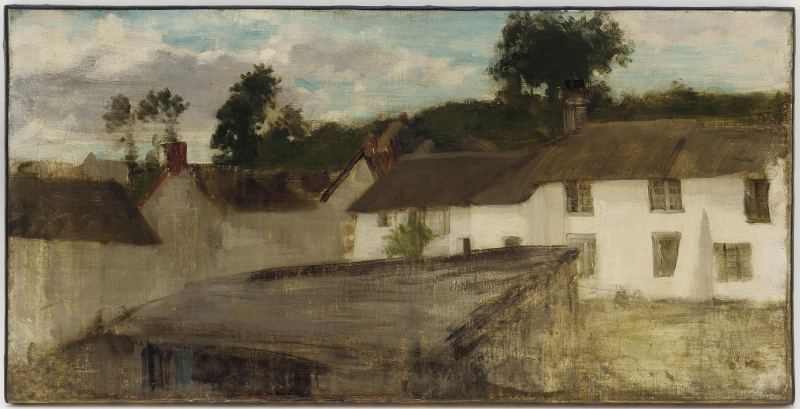Titles
Several possible titles have been suggested:
- 'Green and opal: The Village' (1884, Dowdeswell). 1
- 'Vert et opale: Le Village' (1887, Georges Petit). 2
- 'the Devonshire sky and little village' (1895, Whistler). 3
- 'the Devonshire Cottages - Blue & Silver' (1895, Whistler). 4
- 'Cottages' (1895, Whistler). 5
- 'Landscape' (1905, ISSPG). 6
- 'Dorsetshire Landscape' (1948, B. A. Stubbs). 7
- 'Green and Silver: The Devonshire Cottages' (1980, YMSM). 8
- 'Blue and Silver: The Devonshire Cottages' (2018, WPP).
Whistler's original title was 'Green and opal: The Village', and a later, more site specific one, 'the Devonshire Cottages - Blue & Silver', so it had graduated from green to blue and from semi-precious stone to precious metal in Whistler's value-added title. Despite the risk of confusion in altering the 1980 title, it has been decided to opt for Whistler's own 1895 title 'Blue and Silver: The Devonshire Cottages.'
Description
Several white-washed, thatched, two-storey houses, with a wooded hill behind, are seen against a blue sky with scattered clouds. A single-storey building, possibly with a turquoise door or window at left, is roughly sketched in the foreground. To right are two small standing figures, now very faint indeed.
The figures were still clear in 1905, when it was described as: 'Group of white village cottages, two children's figures to right in the foreground, trees and hedges against the sky in the background. Butterfly signature in right-hand bottom corner.' 9
Likewise, the reproduction in the Pennells' biography of 1908 shows that the two figures and the butterfly signature were originally distinct. 10
Site
The painting appears to show the small town of Colyton in east Devon, south-west England. It is three miles from Seaton and six miles from Axminster. As Whistler noted, there was a direct train from Waterloo in London to Axminster. 11 Colyton nestles in a broad wooded valley between low hills. There are still several old houses with white-washed walls and thatched roofs in the town. The local historian W. G. Hoskins described it in 1954:
'COLYTON is a small and ancient town, grouped around a handsome church. It stands on the river Coly, near its confluence with the Axe, and at the mouth of a beautiful combe which runs back into the greens and outliers of the Blackdown Hills. The whole parish is singularly beautiful, with rolling green hills and deep combes dotted with ancient farmsteads.' 12
Comments
David Park Curry remarked that the subject and composition it was 'remarkably similar' to Whistler's etching Liverdun [13], which dates from 1858. 13
Notes:
1: 'Notes' - 'Harmonies' - 'Nocturnes', Messrs Dowdeswell, London, 1884 (cat. no. 7).
2: Exposition Internationale de Peinture et de Sculpture, Galerie Georges Petit, Paris, 1887 (cat. no. 173).
3: Whistler to W. McN. Whistler, [29 August 1895], GUW #07018.
4: Whistler to D. C. Thomson, 14 October 1895, GUW #08377.
5: Whistler to D. C. Thomson, 23 October [1895], GUW #08375 .
6: Memorial Exhibition of the Works of the late James McNeill Whistler, First President of The International Society of Sculptors, Painters and Gravers, New Gallery, Regent Street, London, 1905 (cat. no. 86).
7: Stubbs 1948 [more] , p. 14 (06.227).
8: YMSM 1980 [more] (cat. no. 266).
9: Memorial Exhibition of the Works of the late James McNeill Whistler, First President of The International Society of Sculptors, Painters and Gravers, New Gallery, Regent Street, London, 1905 (cat. no. 86).
10: Pennell 1908 [more] , vol. 2, repr. f.p. 162.
11: Notebook, [May 1862/1864], GUW #12745.
12: Hoskins, William George, A New Survey of England: Devon, London, 1954. See also http://www.devon.gov.uk (acc. 2014).
Last updated: 31st December 2020 by Margaret







